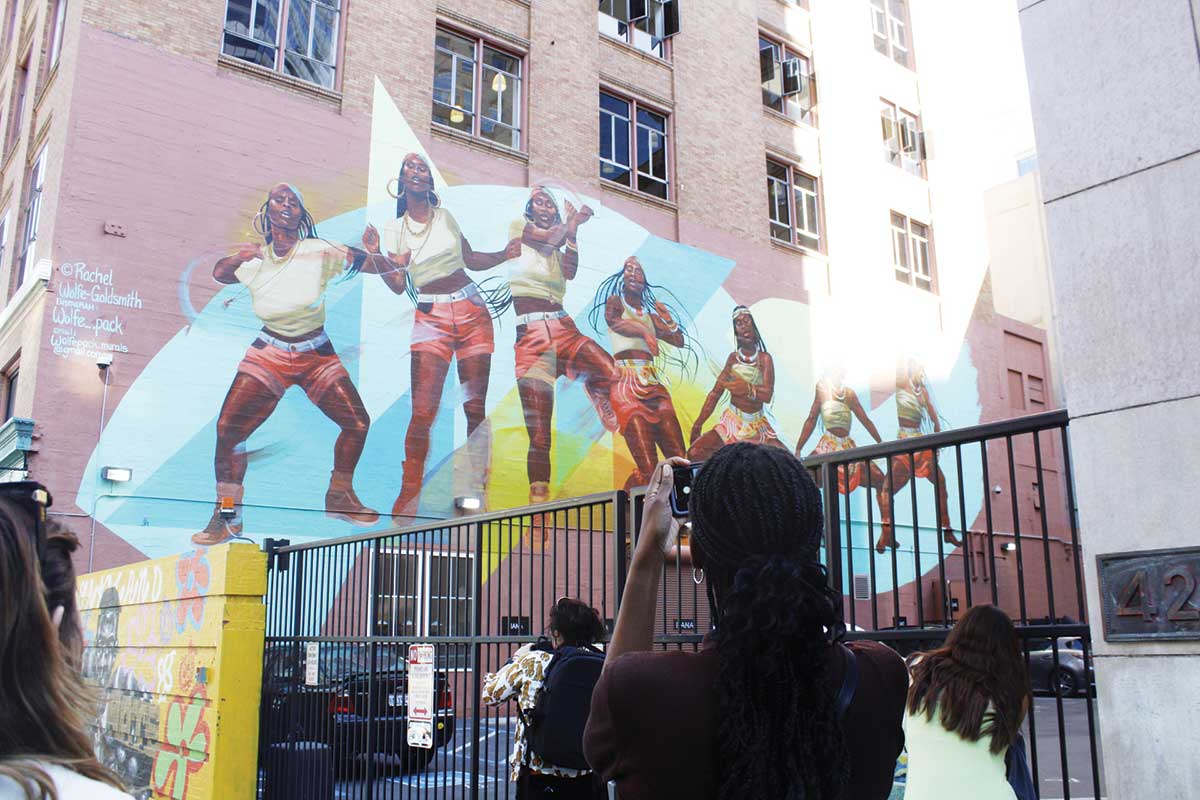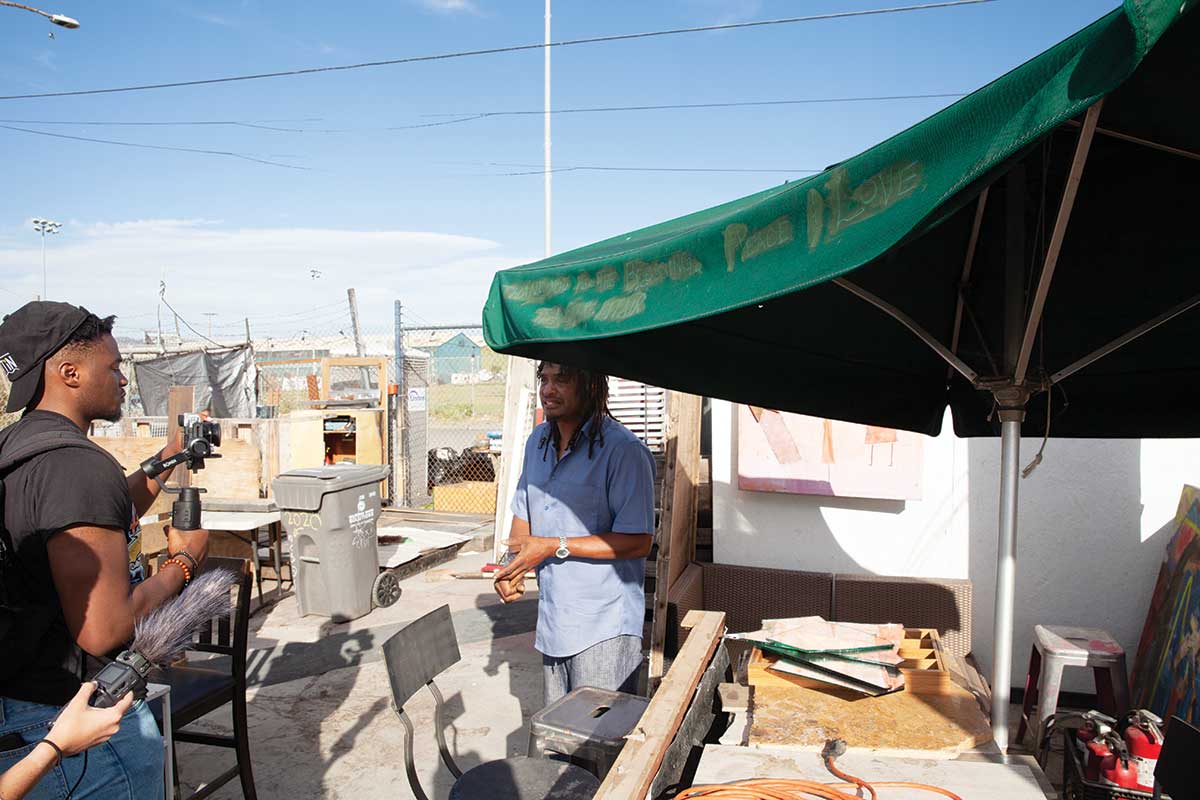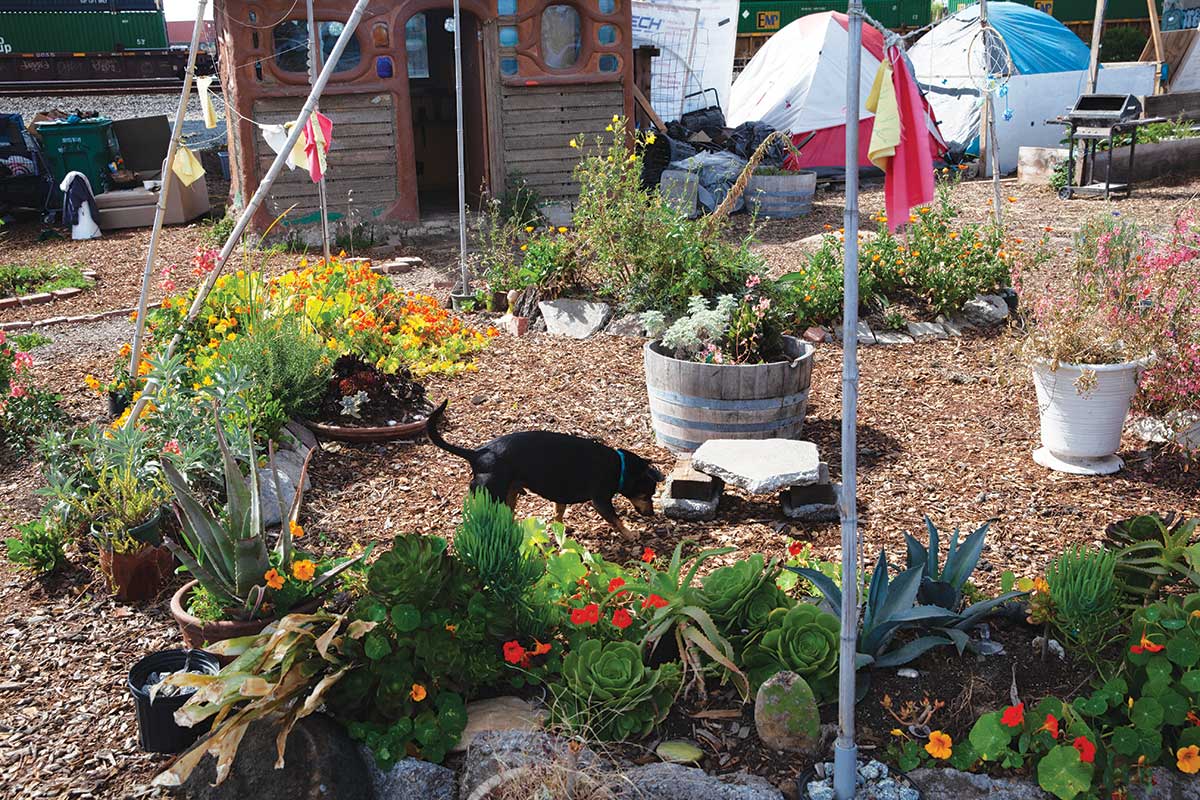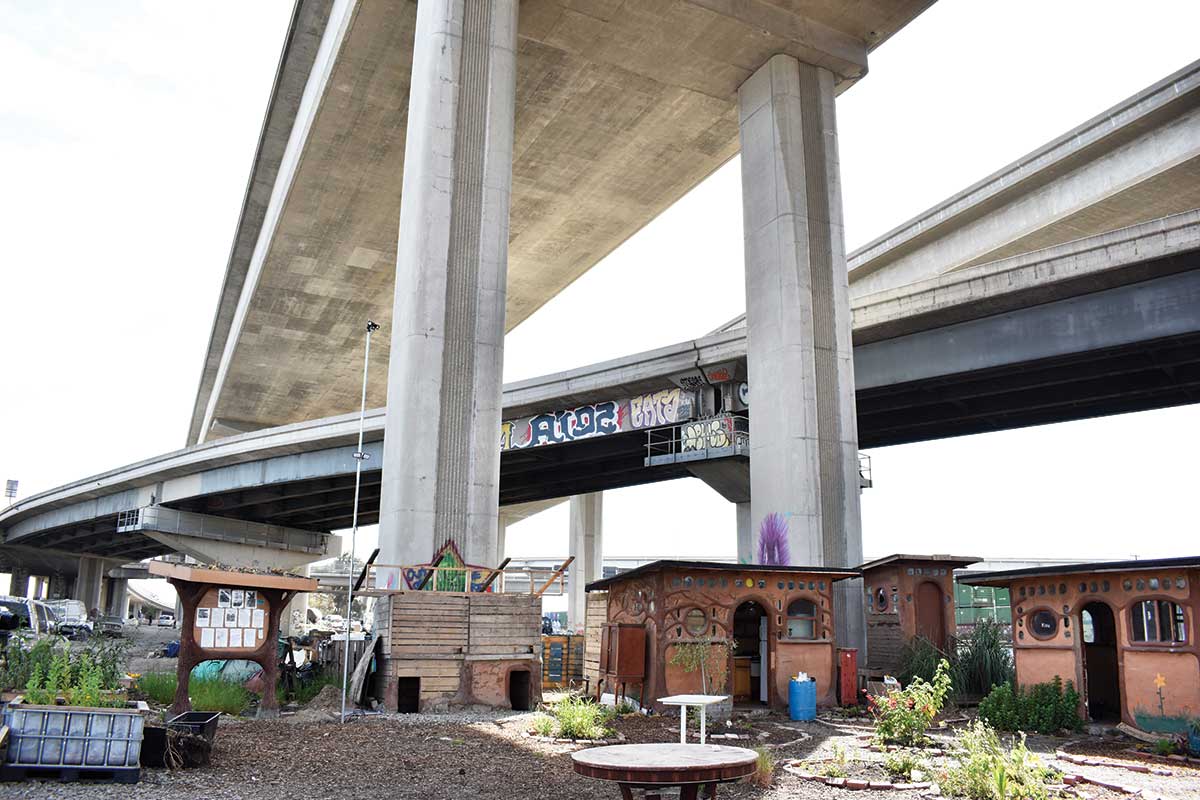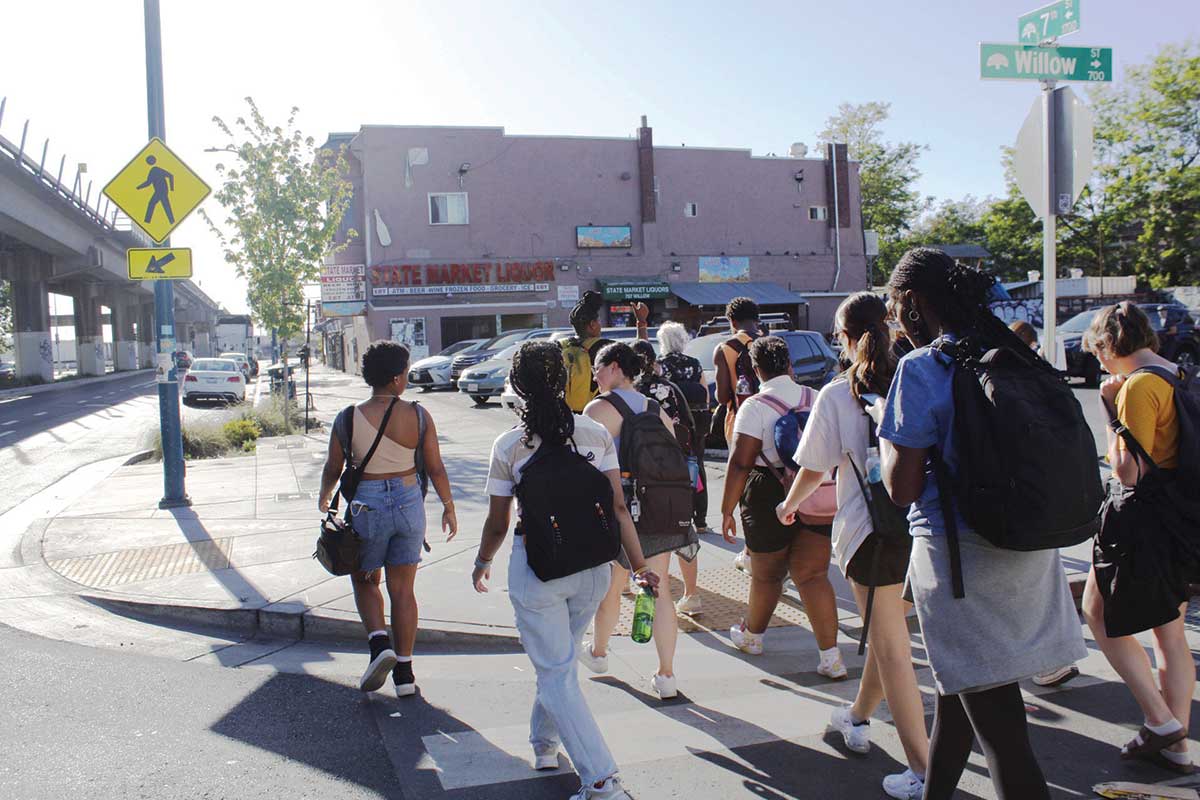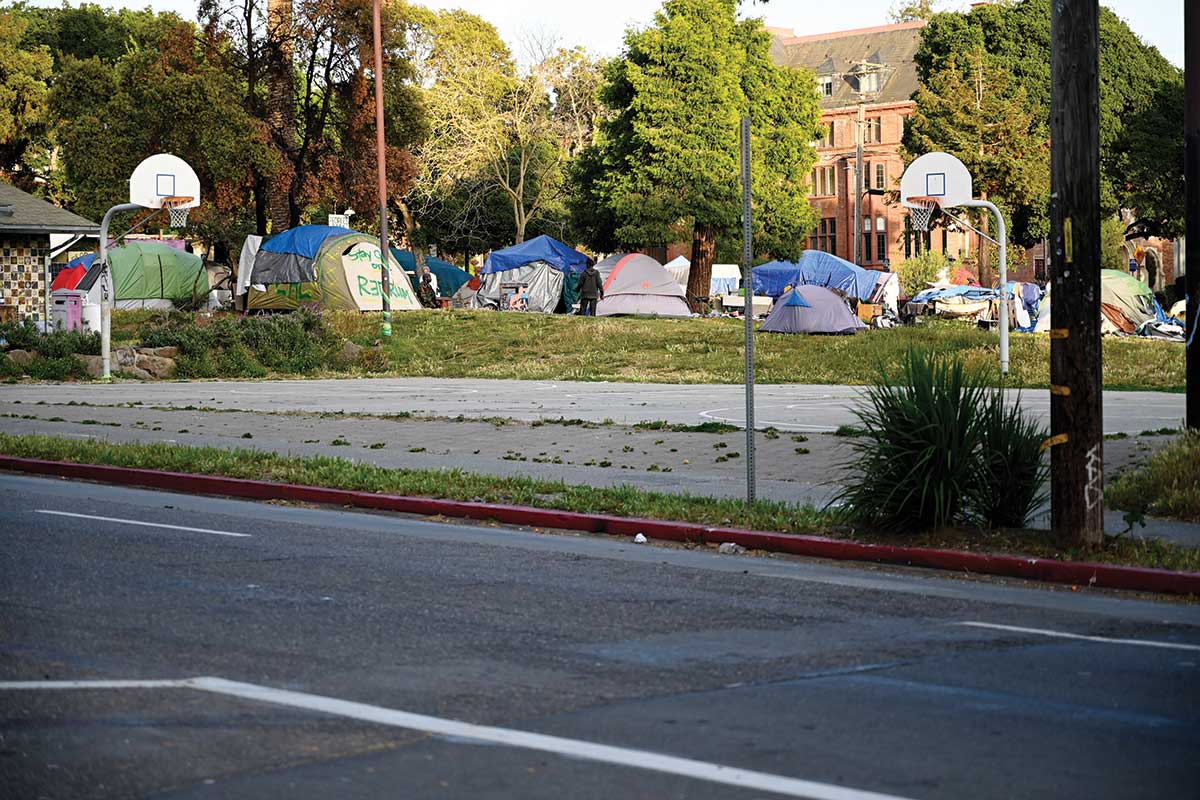Human right to home
Every day, for two weeks, twice a day, the students passed by the encampment where people without homes did their best with tents and tarps stretched across the hollow spaces of the park. Sleeping forms wrapped in blankets — for coverage or privacy — laid along the sidewalk. The park sat between the hotel where 16 University of Dayton students were staying in Oakland, California, and the co-op they used as a base each day for the work they were doing documenting the lives of the unhoused and those working for housing security.
Sophomore Olivia Shirk remembers the park being loud with voices.
“It felt gray, which is sad, because no one wants to live in a gray place,” she said. “How do we help? It’s such a huge issue. A lot of us can walk away from it.
“But some of us can’t.”
Shirk, a communication major, used her documentary photography skills to capture images for “UnHousing: Claiming A Human Right to Home,” an exhibit of the Moral Courage Project, an immersion opportunity through the University of Dayton’s Human Rights Center. In May 2022, UD students traveled to Oakland to learn about the issues of the “unhoused,” a term used to describe people without a physical address.
It’s a project to increase awareness of housing as a human right and build their skills as storytellers to widely share the authentic experiences of those touched by the crisis of homelessness.
This is the fourth project for UD’s Moral Courage Project, a discovery and storytelling venture focused on human rights issues and the individuals who stand up in their communities during moments of crisis. Students commit to the nearly two-year project that includes exploration, education, reflection, travel, documentation and production of final projects to share with the campus community and the public.
“The housing crisis is really complicated,” said senior Amariá Jones in a podcast for the project that she helped produce, “and while it’s typical to focus on despair and to focus on the problems, we instead decided to center the individuals embedded within the communities by thinking creatively about how to build a stable future.”
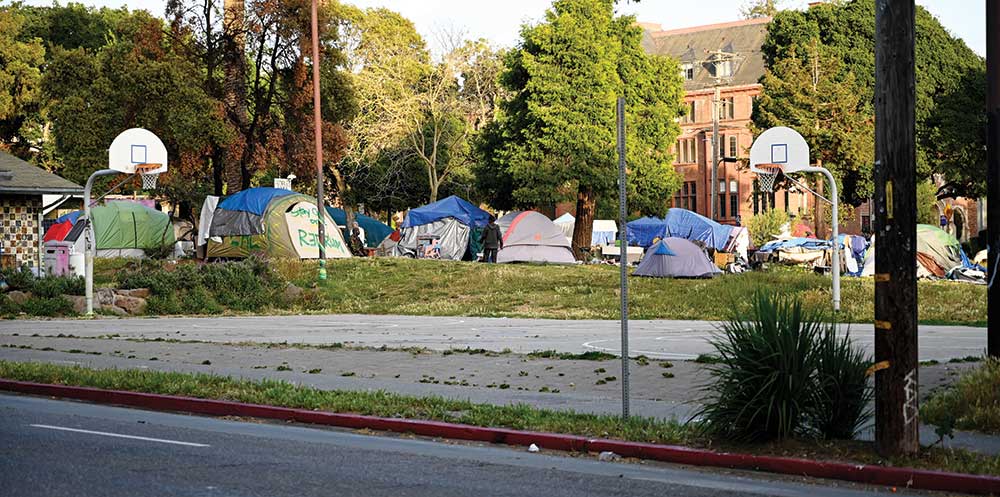
WELCOME TO OAKLAND
The students describe Oakland as a city with bright colors and murals adorning the landscape with painted red poppies, dancers, black panthers and large yellow letters spelling out “OAKLAND.”
Too often, though, they saw tents and other temporary structures erected alongside those murals to shelter those who found themselves outside the good fortunes of Oakland’s economic boom.
Sofia Garcia is a senior political science major who grew up in Madeira, Ohio, outside of Cincinnati. She knew she wanted to be a part of the Moral Courage Project the first time she visited the UD campus and learned about the opportunity. Starting in 2016, students have tackled systemic discrimination and transformative justice in “Ferguson Voices,” border issues in “America the Borderland,” and water as a right in Appalachia and Flint, Michigan, in “Poison and Power.”
She was thrilled to hear that the 2018 cohort went to Texas to study immigration — a topic of personal interest to her — and was even more excited to learn last year that she was going to be a part of the group going to Oakland. It’s an experience — though heartwrenching at times — that she knew would help her vocation.
“When we left the airport in San Francisco and crossed over to exit for Oakland, you saw tents housing the homeless right away. Just massive amounts of people living in tents,” Garcia said. “It kind of hits you like, ‘this is really happening,’ and we just started to work right away.”
The goal was to meet with and document the “upstanders,” those who were standing up for the population of unhoused in Oakland. This included people in organizations working to build affordable housing as well as members of the unhoused community working to improve their situations and that of the people around them. The experience has left an indelible impression on Garcia, who plans on going to law school to become an immigration lawyer.
“I spoke with a homeless immigrant while we were in Oakland. She had faced eviction and struggled to know her rights as she was undocumented; however, she was able to work with lawyers and nonprofits to organize community members and save her home,” she said. “This project inspired in me a need to help a wide range of people that are in need.”
Leora Khan is the founder and executive director of PROOF: Media for Social Justice, the organization that collaborates with UD to present the Moral Courage Project. The project helps UD students understand their privileged positions and how issues of race, class and justice affect a person’s opportunity for housing. She said the trip provided students with an unparalleled opportunity to learn about the issue — according to the city of Oakland, its unhoused population has doubled in the last 10 years.
“It became their classroom and a chance to look at the issue from multiple perspectives,” Khan said. “The story really wasn’t about just homeless people, it was how to create housing for everybody … low-income people are struggling.”
Senior Ifeanyichukwu Nwanoro grew up in the Dayton area, and he is part of the documentary filmmaking team, a new focus for this cohort’s project. His keen eye put a spotlight on the issue that the aspiring filmmaker reflected on with a deeper understanding of the issue after focusing his lens on it.
“We were able to talk and interview and interact with so many different people,” Nwanoro said. “The conversations were with people who were dealing with
addiction and mental illness. And there were those we had clear conversations with. There were those who were working on projects to get people housed who were going through being homeless.”
He was especially struck by a man named John, a member of an unhoused community that had built shelters under a bridge.
John invited Nwanoro on a tour of the shelter he built from found materials. John used bedframes, sheets and shelving for walls. A tarp covered part of an exposed roof. One room was devoted to storage of items people may need.
“This is the living space, the living room where people can come crash,” John said as he took the students on a tour. “I’m not really good with roofs. I’m not really a builder, so someone’s going to help me, I hope, in the next month to put up a real life roof.” John pointed to another space in his home. “That’s actually my bedroom. That’s my walk-in closest — ha, it’s kind of a mess. Come this way, be careful because not everything is stable here.”
Months after they left, Nwanoro learned that the encampment was cleared and the people, like John, had to find a new place
to live.
Nwanoro said he was honored to help document John’s unhoused neighborhood for others to see. “There is a sense of community, and there is a foundation of people there to support each other,” he said.
East Bay Permanent Real Estate Cooperative is part of that foundation in Oakland. The organization is a community-based co-op that creates affordable community housing. Noni Session — one of the “upstanders” the students interviewed — leads the group, and the third-generation Oaklander spoke to UD students to help them prepare for their experience in the city.
She explained that the rising costs of housing is causing those who are working to not be able to afford housing. The cooperative buys and preserves real estate to keep tenants of color in the community, to remove housing from the speculative market, and to address the root problems associated with poverty concentration and neighborhood disinvestment. It also works with real estate investors to invest in communities instead of Wall Street and to build a community where everyone can afford housing.
Nwanoro said the organization’s message was important to hear. He said he valued seeing people work together to implement economic strategies and put aside stereotypes to focus on economic and social development to help the unhoused. More than anything, he wanted to honor the people of Oakland by authentically sharing their stories with others.
ONE BIG CLASSROOM
Forty-eight students applied last academic year for an opportunity to join the Oakland cohort. For the students selected, their preparation included learning from the unhoused population in Dayton, as well as connecting with housing advocates in Oakland before they embarked on the two-week trip.
Natalie Hudson, professor of political science, said the firsthand education helped students connect with the people, not just the issue. Students walked the streets and witnessed the city serving pink eviction notices to those in homeless camps. They saw mothers with children not knowing where they would live next. And, with permission, the students worked to document the experiences of the unhoused through taking notes, videos, photos and sound.
“Seeing [the students] in action and watching them become investigative journalists in a way — making calls and cold calls and going out and interviewing people — I am proud of their confidence and curiosity,” Hudson said.
It’s a highly complex and dynamic issue, said political science associate professor Joel Pruce, a faculty member in UD’s Human Rights Studies Program and director of applied research and learning at the Human Rights Center. The multi-semester course takes that complexity into account.
“It emphasizes the ways in which transformative approaches to addressing the harmful impacts of the housing crisis necessitate rethinking how we consider housing and homes,” Pruce said. “If a house is a commodity, then it will be subject to market logics and trends and out of reach or unstable for many people. If we consider housing as a human right, then we have to figure out, as a society, how to construct a system that prevents people from falling.”
When senior Sarah Behnke told their family about preparing to go to Oakland, family members were worried about Behnke’s safety and the scope of the project.
“I told them I was not really worried at all and was excited rather than anything,” said Behnke, an art history major who grew up in Terre Haute, Indiana. “When we got there, we saw Oakland — the beauty and the problems.”
Behnke said some situations left them feeling disheartened, and it made them reflect back on high school days when they knew of classmates who did not have homes.
“Anybody can be in that situation; it isn’t because they didn’t work hard enough or something like that,” Behnke said. “And just because you’re homeless doesn’t mean you will be forever, because of the transitory nature of being houseless.”
Jones, an English major, is originally from the Anacostia neighborhood in Washington, D.C. “It is one of the poorer parts of D.C. due to ‘white flight,’ gentrification, plus a lack of resources,” she said.
But even with all the challenges in a neighborhood she calls home, Jones found Oakland to be different in how concentrated the encampments are.
“We knew when we went to Oakland, we weren’t going to be the ones to create the change needed to fix the unhousing situation,” said Jones, who wants to pursue a career in human rights after graduation. “I was shocked to see that you can walk from a neighborhood that had homes, and then go right down the street and see a bunch of people who were encamped under the overpass.
“Homelessness looks different everywhere, but it has the same effect on people who don’t have the ability to go somewhere, close the door behind them and have stability.”
ART AND ADVOCACY
Unlike other UD opportunities that may focus on service to a community through creating tangible solutions together — such as building a solar array or teaching young students to read — the Moral Courage Project is an academic experience that serves by sharing stories and building awareness of the issues leading to housing insecurity.
“It’s something we value in human rights education at UD because it is connecting teaching to research to advocacy,” Hudson said. “Through teaching and preparatory work and through scholarship on human rights, we know that change can come about when those pieces come
together.”
The experience gives students skills around interviewing, understanding people, getting to know the power of relationships and how change happens.
On March 24, the students presented the exhibition “UnHoused” in conjunction with the annual presentation of the Romero Human Rights Award by UD’s Human Rights Center. The exhibition includes a podcast, a documentary film and a print publication.
Senior Reagan Miller, a graphic design major from Columbus, Ohio, said she struggled at the beginning of her college career because of the protocols in place for the pandemic. To help remedy that, she sought out a singular experience to underscore the value of her education.
“Art and activism are two things that I love, so this was a perfect opportunity for me,” Miller said. “The people of
Oakland have so much pride, and it felt like they were so excited to share their stories with us.”
Glenna Jennings, associate professor of art and design and director of engaging communities beyond campus through UD’s Hanley Sustainability Institute, worked with Miller and other students to hone their documentary and presentation skills for the print publication.
Miller layed out the art that shows trucks with flat tires and tents lined up looking like they are piled on top of each other.
“All of these things are stuck in one place trying to be a shelter for people,” she said. “And I look over and see pink mandatory evacuation fliers posted up saying people had to evacuate by the end of the day.” She included the photo of the fliers in many languages in the publication.
“The students were in the work of knowledge production, and they have so much to share from the experience,” Hudson said. “When you’re out there looking at these things, it’s right under your nose and that’s a different sort of reality check. They saw people struggle with this question, ‘How are you evicted from a nonexistent structure, just space outside?’”
Hudson said the experience of students being invited into Oakland and listening to communities resonates with UD’s mission.
“The Moral Courage Project reflects very clearly the mission and values in our Catholic, Marianist identity,” Hudson said. “I think it’s a signature program with UD because it reflects pursuing the common good.”
And it’s tough work — passing by the encampment near their hotel twice a day, touring the city, talking with advocates and officials led the students to many earnest after-hours conversations. During a car ride, students shared how they felt: powerless, dismayed, hopeful and activated. It was exhausting. It was energizing. And it brought the students of varying majors together, united in purpose.
“I know that I will be friends with people from UD in that group that went to Oakland forever,” Miller said. “We all came together for one common goal. It is really hard to find people you are in sync with in terms of your beliefs and morals.”
Miller summed up the Moral Courage Project: “It is literally the best experience I’ve had at UD.”
